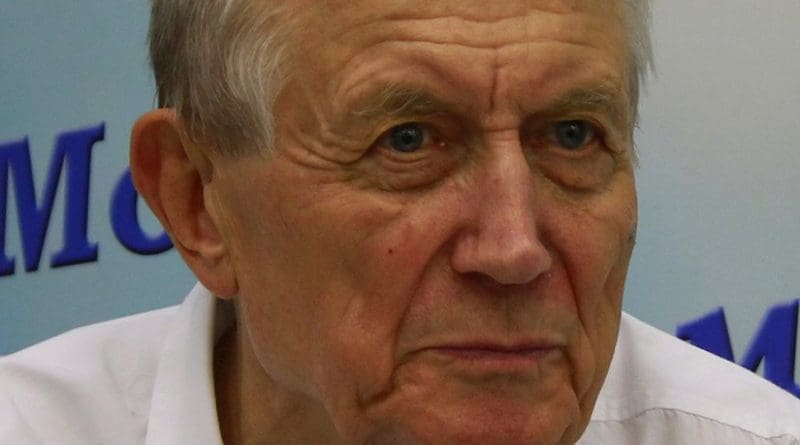Russian Poet Yevgeny Yevtushenko Dead At 84
By RFE RL
(RFE/RL) — Acclaimed Russian poet Yevgeny Yevtushenko has died in a U.S. hospital in Tulsa, Oklahoma, at the age of 84.
Yevtushenko’s close friend, Mikhail Morgulis, told the TASS news agency on April 1 that “five minutes ago, Yevgeny Aleksandrovich passed away.”
Yevtushenko had been reported hospitalized in serious condition late on March 31. His wife, Maria Novikova, and their two sons, Dmitry and Yevgeny, were reportedly with the poet when he died.
“Yevtushenko was a legend both in his very early years and in his mature years,” Natalya Solzhenitsyna, widow of Nobel Prize laureate Aleksandr Solzhenitsyn, told Russian state television.
“He lived based on his own principle: a poet in Russia is more than a poet, and he was truly more than a poet,” she said. “He was a citizen with a clearly defined civic position. I think he will be long remembered, as he was a lively person responding to injustice and receptive to major events.”
Russian President Vladimir Putin offered his condolences to Yevtushenko’s family, Kremlin spokesman Dmitry Peskov said.
“Yevtushenko was a great poet and his legacy is part of Russian culture,” Peskov said.
Born in Siberia in 1932, Yevtushenko published his first collection of poetry to acclaim in 1952. That year, at the age of 20, he became the youngest member of the Soviet Writers’ Union.
He became a leading figure of the so-called Sixties Generation in the Soviet Union and of the Thaw period under Soviet leader Nikita Khrushchev.
In 1961, he published his most famous poem, Babi Yar, based on the Nazi German massacre of Jews in Kyiv, which lambasted Soviet distortions of history and Soviet anti-Semitism.
The same year, he published The Heirs Of Stalin, a poem about how the shadow of Stalinism still lingered over the country. The poem was originally published in the Soviet daily Pravda, but then was not officially published in the Soviet Union again until 1986.
In 1965, he signed a letter opposing the Soviet prosecution of poet Josef Brodsky, and in 1968, he signed another letter condemning the Soviet-led Warsaw Pact invasion of Czechoslovakia. Two days after the beginning of the invasion, he wrote a protest poem titled Tanks Are Moving In Prague.
In later years, he was a controversial figure.
In 1987, when he was made an honorary member of the American Academy of Arts and Letters, Brodsky protested against the honor, saying that Yevtushenko’s criticism of the Soviet Union had remained within “acceptable” bounds for the Soviet authorities.
In 1989, Yevtushenko was elected a member of the Congress of People’s Deputies in the Soviet Union’s only relatively free elections. In 1991, he supported Boris Yeltsin, but later broke with him over the disastrous 1990s war in Chechnya.
He moved to the United States in 1991 and, since 2007, had split his time between the United States and Moscow.
According to Russian media reports, he expressed a desire to be buried at the writers’ community of Peredelkino outside Moscow, near the grave of Nobel laureate Boris Pasternak.

